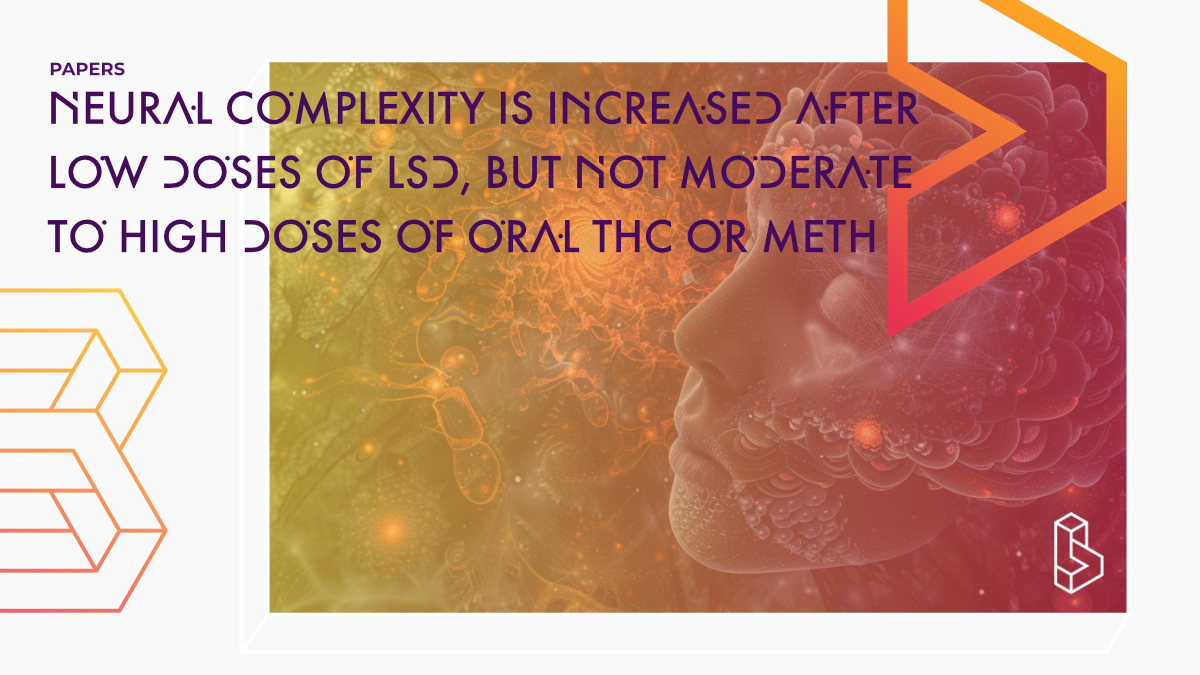This re-analysis (n=73) investigates the effects of low doses of LSD (13-26µg; n=21), THC (7.5-15mg), and methamphetamine (MA; 10-20mg) on neural complexity in healthy volunteers without inducing altered states of consciousness. Utilizing a within-subjects design over three laboratory visits, the study records resting state EEG data to measure Lempel-Ziv complexity and spectral power. Results demonstrate that only LSD, not THC or MA, dose-dependently increases neural complexity and reduces delta and theta power, while THC and MA respectively decrease and increase alpha power, primarily in frontal regions.
Abstract of Neural complexity is increased after low doses of LSD, but not … THC or meth
“Neural complexity correlates with one’s level of consciousness. During coma, anesthesia, and sleep, complexity is reduced. During altered states, including after lysergic acid diethylamide (LSD), complexity is increased. In the present analysis, we examined whether low doses of LSD (13 and 26 µg) were sufficient to increase neural complexity in the absence of altered states of consciousness. In addition, neural complexity was assessed after doses of two other drugs that significantly altered consciousness and mood: delta-9-tetrahydrocannabinol (THC; 7.5 and 15 mg) and methamphetamine (MA; 10 and 20 mg). In three separate studies (N = 73; 21, LSD; 23, THC; 29, MA), healthy volunteers received placebo or drug in a within-subjects design over three laboratory visits. During anticipated peak drug effects, resting state electroencephalography (EEG) recorded Limpel-Ziv complexity and spectral power. LSD, but not THC or MA, dose-dependently increased neural complexity. LSD also reduced delta and theta power. THC reduced, and MA increased, alpha power, primarily in frontal regions. Neural complexity was not associated with any subjective drug effect; however, LSD-induced reductions in delta and theta were associated with elation, and THC-induced reductions in alpha were associated with altered states. These data inform relationships between neural complexity, spectral power, and subjective states, demonstrating that increased neural complexity is not necessary or sufficient for altered states of consciousness. Future studies should address whether greater complexity after low doses of LSD is related to cognitive, behavioral, or therapeutic outcomes, and further examine the role of alpha desynchronization in mediating altered states of consciousness.”
Authors: Conor H. Murray, Joel Frohlich, Connor J. Haggarty, Ilaria Tare, Royce Lee & Harriet de Wit
Summary of Neural complexity is increased after low doses of LSD, but not … THC or meth
The use of very low doses of psychedelics every few days has gained widespread public attention in the past decade. The medical and scientific community has begun to investigate safety and therapeutic efficacy. Randomized controlled trials in healthy populations have shown that low doses of LSD acutely increase ratings for well-being, but no published RCT has examined patient populations. Further research is needed to determine health outcomes related to low dose regimens or microdosing practices.
Researchers are working to identify objective markers and potential mechanisms that may be driving therapeutic reports, including increased plasma levels of brain-derived neurotrophic factor (BDNF) and functional brain changes at both rest and during cognitive tasks using fMRI and EEG.
Neural complexity has gained scientific interest in the fields of psychedelics and consciousness, and is superior to other EEG measures in discriminating conscious states. It has the potential to consolidate existing theories in the science of consciousness.
Find this paper
https://doi.org/10.1038/s41386-024-01809-2
Paywall | Google Scholar | Backup | 🕊
Cite this paper (APA)
Murray, C. H., Frohlich, J., Haggarty, C. J., Tare, I., Lee, R., & de Wit, H. (2024). Neural complexity is increased after low doses of LSD, but not moderate to high doses of oral THC or methamphetamine. Neuropsychopharmacology, 1-9.
Study details
Compounds studied
LSD
Topics studied
Microdosing
Study characteristics
Open-Label
Re-analysis
Participants
73
Humans
Compound Details
The psychedelics given at which dose and how many times
LSD 13 - 26μg | 2x

